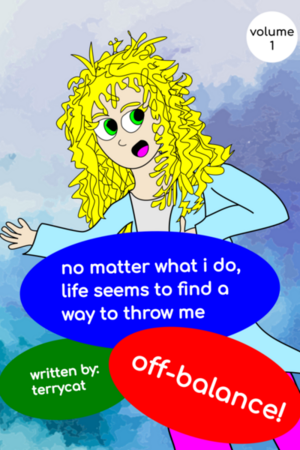Chapter 30:
Chapter 30: Standing Between Confessions and Goodbyes (II)
For The Golden Flower I Stole In That Rain
I had just poured the simmered stew into a chipped white bowl when the front door opened with the same mechanical squeak it always made. The sound of wind and outside voices momentarily bled in—then stopped.
My body didn’t flinch. I didn’t even turn around. The familiar clack of heels was enough for me to realize who it was.
I stirred the pot once more, watching the thickened sauce trail off the ladle like lazy honey.
A second passed. Then three. I can already picture her with crossed arms and accusatory glare as if ignoring her existence was a war crime.
“…You didn’t lock the door again.”
There it was emotionless voice that sounded like a mermaid’s song,
“I figured you’d come.”
I finally turned.
Kousaka-san was standing with her usual unbothered posture, arms crossed loosely over her dark green trench coat. She wore a black sweater underneath, adorning her ‘lost royal princess’ looks.
The golden hair crowning her was slightly frizzed from the December wind.
I didn’t ask why she was here. I already employed the fact that she’s the one I was looking for earlier.
“…Seriously,” she muttered, letting herself in like it was her own place. She shut the door with her foot and threw her bag by the futon. “One of these days, someone’s going to rob you.”
“If that happens, I hope they take the kotatsu,” I replied, deadpan. “It’s been eating more electricity than cold lately.”
She raised an eyebrow. “You joke like someone who’s already resigned to poverty.”
“For five years, yes.”
I glanced at the French stew again, and shrugged.
“...I would be lying if I hadn’t said I was waiting.” I murmured, setting down the ladle. “At this point, maybe I should just give you a spare key to make your breaking and entering a little more official.”
She blinked at me. Her usual poker face cracked a little.
“…Huh.” Her lips twitched. “You say that like you’ve already made peace with the idea.”
“I have,” I said. “About thirty visits ago.”
“I only visited around eight times.”
“That you know of.”
She narrowed her eyes, but didn’t argue.
Instead, she pulled off her coat and stepped toward the stove.
I immediately registered the fragrance of lavender she emitted, completely taking over whatever aroma this unpronounceable dish wafted earlier.
Her nose crinkled, catching the scent of meat and garlic.
“Wait…is that—?” Her eyes widened. “Beef bourguignon?”
How could she pronounce that in just one try?
I tilted my head. “Something like it.”
“You actually made it?” she asked, peering into the pot with a look that was both suspicious and oddly touched. “I thought you were bluffing when you said you’d cook it someday.”
“I don’t bluff. I just procrastinate.”
She leaned in slightly, inspecting the stew like a seasoned judge on a cooking show.
“…You used grape juice instead of wine,” she muttered.
“I’m underage.”
“Still. No thyme, either. And those carrots are cut way too thick.”
“You noticed all that in three seconds?”
She turned to me, smirking faintly. “I spent 13 years in France. You think this tongue was raised on instant curry?”
I rolled my eyes. “You’re really gatekeeping a dish from your childhood?”
She shrugged, brushing hair behind her ear. “I’m just saying—if you’re going to replicate a classic, you should do it properly.”
“Says the girl who microwaved toast last week.”
“That was a philosophical experiment.”
“A tragic one,” I replied. “The bread still hasn’t forgiven you.”
We looked at each other. And then we both giggled.
Cooking for me has always been a rather opaque affair.
It’s the easier version of painting—where every step isn’t a conscious decision and ingredients a deliberate choice. You can just modify or reshuffle the steps and still get the same result, one that cannot be achieved in painting.
With a canvas, I know what I’m doing.
But in these pots and pans, I’m an alien who landed on a different planet.
It’s a constant negotiation with unseen forces in the kitchen.
Eventually, I nodded toward the kotatsu. “Go sit. It’s hot. Try not to burn your very French tongue.”
She made a soft sound that could have been a laugh, and walked over. Her presence filled the tiny apartment, not with noise—but with something weightier—a presence that lingered even after she left.
I plated the food in two mismatched ceramics.
Two bowls, two spoons.
No wine glasses, no candles, no extravagant side dishes.
Just the two of us, the warmth and the understanding of effort beneath it.
“Here's Shimizu Itsuki’s special cheap beef borji…borwi…bogigwon, ah, fine! French stew!”
“Bourguignon.”
“Bouwi—”
“Shut up, would you?”
“I'm trying hard here, okay?”
No thank yous when I placed her portion in front of her. I didn’t expect it anyway. Her presence alone is the source of gratitude for me.
Then, finally, she took the first bite.
The moment her spoon left her lips, her brows lifted—not dramatically, but enough for me to notice.
“…You’re kidding,” she said, chewing again. “This actually tastes like…”
She didn’t finish and reached for another portion again.
I sat across from her and started eating too.
For a first timer, I can’t really say if I made this dish well. I’m just depending on Kousaka-san’s reactions for an assessment.
The beef might have been undercooked or the other way around. The sauce could’ve lacked the undertones that wine would’ve given.
Unlike a finished painting, where my signature felt earned, this felt more like a fortunate accident. A happy convergence of elements.
I am glad that it was edible at least, a memory regained for a Christmas dinner.
“…So?” I asked.
She exhaled, still chewing.
“…You really made this just from a video?”
“MeTube tutorial,” I answered. “The host was this middle-aged woman in a Santa hat.”
She stared at me like I’d just admitted to painting the Sistine Chapel by copying a coloring book.
“…Seriously. What are you?”
“Just a guy who overcompensates with food and floats on this boring world,” I said.
Another pause.
“…My mom used to make this,” she murmured, not looking at me.
“I figured.”
“She never wrote the recipe down. She said it had to be remembered through taste.”
I feel like betraying her for a moment. May she not haunt me tonight.
“…Did I get close?”
No answers.
Yet I could perceive that the way she kept eating like there’s no tomorrow.
After we ate, I decided to volunteer on washing the dishes.
The plates were still warm, streaked with traces of beef bourguignon sauce, and I already regretted that I cooked this meal or at least, the one cleaning the leftovers.
I could hear Kousaka-san tapping the surface of the kotatsu. Like she was waiting for the right moment to interrupt the silence.
Then came the unexpected question.
“When are you planning on rebuilding the stall?”
The question lingered in the warm steam of the kitchen sink.
I didn’t answer right away. The clinking of ceramic under water filled the silence, and I scrubbed a little harder than I needed to. Like maybe if I focused enough, I wouldn’t have to answer at all.
I dried my hands with the towel and turned to her. She was still there, legs tucked beneath her, chin resting lightly on her hand. Waiting.
“I’m not.”
Her brows furrowed. “What do you mean?”
“I mean, I’m not rebuilding. Not yet.”
Kousaka-san looked away.
And I knew what she was going to say before she even opened her mouth.
“But…wasn’t that everything to you? I can get you a new cart and the capital so you can start again. I mean, it’s nothing compared to what I’m capable of.”
“I appreciate that,” I said softly. “I really do. But…”
I looked her in the eyes.
“For now, it's really impossible.”
“Why?”
“I have reasons to believe it wasn’t just some random theft. I can’t prove it yet, but I deduced that my father is behind it. Since threatening to move me to Tokyo by force, every little chance I had to build something on my own got crushed the moment it started working.”
She didn’t say anything.
So I kept going.
“If I take your money and rebuild, what’s stopping him from doing it again? What’s stopping him from tearing down whatever I try to build? Seeing me survive alone for five years surely hurt his pride and severely wanted to restore it by making me need him.”
I sat across from her, slowly. The kotatsu’s warmth crept into my bones, but her words pierced deeper than cold ever could.
“So I can’t let you do that for me. If I rebuild, it has to be with my own hands. Otherwise, I’m just living off someone again. And I promised myself I’d never do that. If he evers destroys anything again, at least that’s mine.”
Her lips trembled at that. I could see it—frustration warring with understanding, pride colliding with guilt.
“Do you think I’d ever hold it over you?”
“No,” I said. “That’s the thing. I know you wouldn’t. But he would. My father would twist it, somehow. Turn it into proof that I’m weak.”
“Fine…I don’t think you’d appreciate it if I forced it anyway.”
After a breath, she spoke again.
“Can I answer your questions?”
I blinked, a bit too slowly. “What?”
“Last week. When you…confessed. I didn’t say anything. I thought you’d bring it up again eventually. But you didn’t.”
“You didn’t seem like you wanted me to,” I said.
“I didn’t,” she replied, setting her hands gently to her lap. “But I don’t like unfinished things either.”
Her words were as clinical as they were honest. As if we were discussing a missed homework submission instead of the unspoken feelings that had kept my chest tight for days.
“Shonan High was never part of the plan,” she went on, brushing her bangs behind her ear as she leaned forward slightly. “I transferred from Tokyo eight months ago. My grandmother—Marie Fontaine—asked me to come here. Her husband, my grandfather, passed away last spring. She didn’t want to be alone. And I came.”
“I bet that's reasonable grounds to comply.”
Kousaka-san nodded. “I didn’t argue. It wasn’t even about grief. I just…didn’t want to make her more lonely than she already was. That’s the kind of love my mother would’ve wanted me to give her.”
She paused. I didn’t interrupt.
“You probably know her. Her wallet had a miniature Eiffel Tower keychain in it. She used to come to your dango stall every Thursday.”
I blinked, the realization hitting me.
Eiffel Tower.
I remember giving somebody extra pieces of mitarashi dango when she forgot her purse.
And then I was the one who found it.
Watanabe-san?
So that’s why she had that rare blue eyes and clothing far different from the people around her age?
“Oh.”
So she’s the invisible wingman between the two of us for months? How the heck I haven’t recognized it?!
“That’s right. That was her,” she said, catching my recognition. “And she told me a lot about the orphan who refused to be pitied—always selling sweets with a bandage over his cheek but a smile in his eyes.”
My hands curled a little under the kotatsu. Not because I was embarrassed. Just...unsure of what to feel when someone else’s memory of you gets passed around like a secondhand painting.
“My first day at Shonan High was sort of funny in hindsight. I remember seeing you from the classroom windows where Yuuya and the others had you cornered in the empty yard. You tried to fight back, but got worn out easily and got beaten up.”
My cheek burned with embarrassment. Having my story of failure told by other people was the last thing I needed, not even on my deathbed. I would literally rise up six feet under to stuff someone’s mouth with mud if they did that.
“I looked away,” she said plainly. “Thought you were just another dumb guy trying to act tough. And I never thought of you again.”
That stung a little more than it should’ve, but I nodded. That version of me didn’t deserve sympathy anyway.
“But then, a week later, my grandmother took me to the park to visit the dango stall she always used to drop by.”
Did she say that the seller was ‘too polite for his own good’? That would be a Watanabe-san thing to say.
She offered a faint smile that barely touched her lips.
“I didn’t expect it to be the same classmate I saw on the ground. Despite bandages and bruises on your face, you’re still smiling and laughing with customers as if nothing happened.”
I stayed silent. I’d heard it before: that my smile was unsettling.
“I didn’t get it,” she said, voice quieter now. “You should’ve been angry. Or depressed. Or…broken. But you weren’t. Artists get stuck on things they can’t explain. That’s why I kept coming back sitting on the bench.”
I turned to her. “So I was…a curiosity? A guy that is smiling even though I was already limping?”
“No. I just liked the routine. The park became a safe place. You being there made it feel like it wasn’t changing.”
I didn’t know what to say. The idea of me being someone’s constant felt almost laughable.
“And then?” I asked. “Why did you start barging into my place?”
She averted her gaze again.
“Because…that was my way of saying sorry.”
I blinked. “Sorry for what?”
“For not stopping Yuuya and the others. Even though I ignored it, I was still a witness the moment my eyes landed on you.”
“Don’t feel guilty. I can actually take a beating worse than that.”
“I’m not good with words,” she added, almost as an afterthought. “I don’t know how to comfort people. But I know how to make space livable. So I did what I could.”
I leaned back, letting her words settle in the air between us. They weren’t sweet. None of this was romantic. If I could describe it, it was her method of atonement.
She doesn’t need to do anything—because I was the one willing to give that kind of effort.
But whatever settled in the past, she was already forgiven.
I reached down under the kotatsu and pulled out a small paper bag.
“Here.”
She raised an eyebrow.
“Don’t tell me it’s another bento box.”
“No. It’s a gift. For Christmas.”
“Between friends?”
I nodded. “Between friends.”
Although she was eyeing me with suspicion, she took the bag and slowly unwrapped it.
Inside, a slim, navy velvet box. She opened it to reveal a pink hairpin. It was simple, cheap, but chosen with care. The simplicity stands out against her other luxury jewelries.
“…Practical,” she said, holding it up. “You think I can’t afford to tie my hair?”
“I just imagined your frustration if your hair falls in your face while sketching.”
She stared at the hairpin a bit longer before placing it gently back into the box. “…You’re really an imaginative pervert sometimes, Shimizu.”
“At least the imaginations serve with decent purpose.”
“…Touché.”
When she tucked the paper bag into her tote bag, I said the greetings I haven’t said and heard in five years.
“Merry Christmas, Kousaka-san.”
The words might have tasted sour in my tongue, but at least the bitterness of what left me behind was replaced by the glimmering hope of someone who stayed.
“…Merry Christmas, Shimizu.” she murmured after hesitating for a second.
I said it before that I don’t consider myself as a victim of holiday blues because I don’t really pay much attention about these kinds of events.
It was a surprise how one night or one person can change anything.
Kousaka-san was the reason that this day mattered again.
She was the reason why I started celebrating again.
Not just today, but for the years to come.
I’m not sure what kind of spell she laid out on me, but her presence brought a sense of normality in everything.
I laughed a little more.
I put down the masks like my life didn’t depend on them before.
I found pleasure on small things.
“Oh, right, I promised to let you see my paintings, right? I'll explain the stories behind them as a bonus.”
That melted the ice that settled between us all of this time, and her face lit up in excitement.
“Two promises granted in a single night, and a bonus. I’ll give you 25 points for that.”
“Points for what?”
“That’s a secret.”
Whatever it was, I didn’t need to know. Some things, I was just happy to feel.
In that moment, with canvases between us and the weight of the past behind us, I thought that this was what healing possibly looked like.
A lingering moment on Christmas night with a girl who once sat on a park bench sketching a stranger, now staring back at me, painting my life back in color.
That was all the gift I ever needed.




Please sign in to leave a comment.